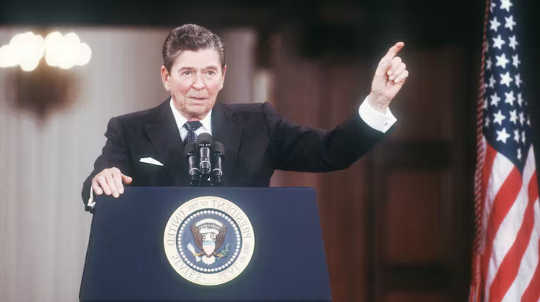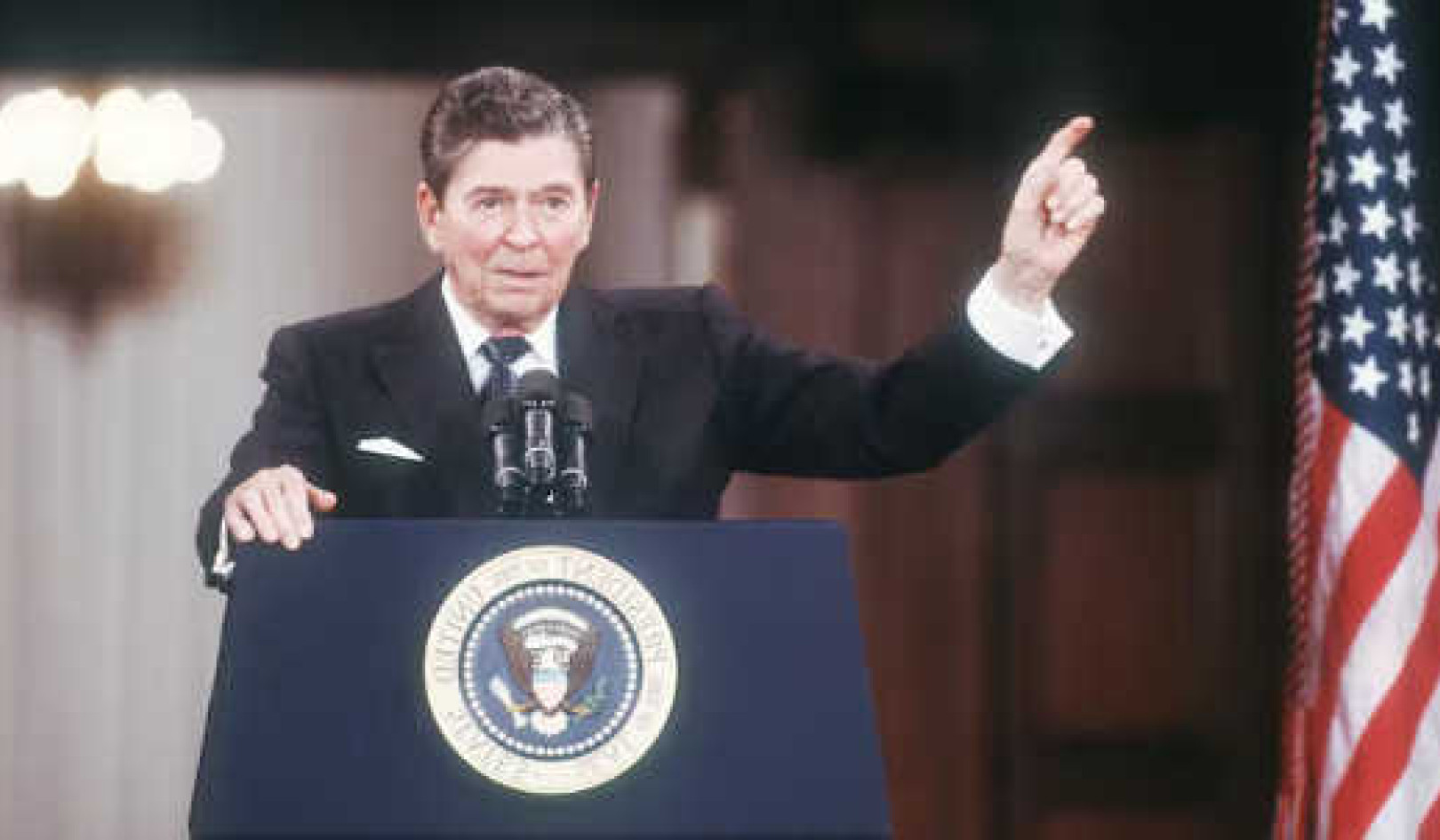
President Ronald Reagan, shown here speaking in Moscow in 1980, was an early adopter of neoliberalism in the U.S. Dirck Halstead/Liaison
Neoliberalism is a complex concept that many people use – and overuse – in different and often conflicting ways.
So, what is it, really?
When discussing neoliberalism with my students at the University of Southern California, I explain the phenomenon’s origins in political thought, its ambitious claims of promoting liberty and its problematic global track record.
‘Markets work; governments don’t’
Neoliberalism contends that markets allocate scarce resources, promote efficient growth and secure individual liberty better than governments.
According to the progressive journalist Robert Kuttner, the “basic argument of neoliberalism can fit on a bumper sticker. Markets work; governments don’t.”
From such a perspective, government represents bureaucratic bloat and political imposition. Government is wasteful. The verve of capitalism, along with a limited democratic politics, is neoliberalism’s balm for all that ails humankind.
Completing his bumper-sticker mantra, Kuttner continues, “there are two corollaries: Markets embody human freedom. And with markets, people basically get what they deserve; to alter market outcomes is to spoil the poor and punish the productive.”
Evolution of neoliberalism
The moniker “neoliberalism” was coined by Austrian economists Friedrich von Hayek and Ludwig Von Mises in 1938. Each elaborated his own version of the notion in 1944 books: “The Road to Serfdom” and “Bureaucracy,” respectively.
Neoliberalism ran contrary to the prevailing economic strategies promoted by John Maynard Keynes, which encourage governments to stimulate economic demand. It was the opposite of big-government socialism, whether in its Soviet manifestation or its European Social Democratic version. Neoliberalism’s proponents embraced classical liberal principles such as laissez-faire – the policy of not intervening in markets.
By the 1970s, Keynesian policies were faltering. Hayek’s organization, the Mont Pelerin Society, had drawn wealthy European and American benefactors to its ranks and funded powerful think tanks such as the American Enterprise Institute and the Cato Institute. These groups refined neoliberalism’s message, making it a viable and attractive ideology.
By the 1980s, neoliberalism had gained ascendancy with Republicans such as president Ronald Reagan. High-ranking officials in the Democratic presidential administrations of Jimmy Carter and, later, Bill Clinton also embraced neoliberalism.
Neoliberalism was also championed by conservatives like British Prime Minister Margaret Thatcher and by international institutions such as the World Bank and International Monetary Fund.
But deregulating free markets had some unfortunate political consequences. It promoted financial and labor crises in the U.S. and U.K. and exacerbated poverty and political instability. The crisis was felt from the Global South to the U.S. Northwest, manifesting in the anti-World Trade Organization protests often referred to as the “The Battle of Seattle.” To critics like Frantz Fanon and David Harvey, neoliberalism is more akin to neoimperialism or neocolonialism. Basically, they contend, it achieves old ends – exploiting the global working class – through new means.
This critique fuels another argument: that neoliberalism harbors anti-democratic sentiments. What if citizens prefer government regulation and oversight? History demonstrates that neoliberal stalwarts would still push market orthodoxy over popular opinion.
An extreme example of this was Hayek’s support of the repressive Pinochet regime in Chile. Augusto Pinochet toppled the popular socialist government of Salvador Allende in 1973. Pinochet was cautiously welcomed by the Nixon administration and looked upon favorably by both Reagan and Thatcher. In their view, Pinochet’s commitment to neoliberalism trumped his anti-democratic character.
This history helps explain the election last year of Gabriel Boric, Chile’s 36-year-old president. Boric ran on an agenda for profound change following a period of turmoil over Pinochet-era policies. His campaign slogan was “If Chile was the cradle of neoliberalism, it will also be its grave.”
A flawed, contradictory ideology
Beginning in the 1980s and for a long time after, neoliberalism for many Americans conjured individual liberty, consumer sovereignty and corporate efficiency. Many Democrats and Republicans alike championed it to justify their policies and attract voters.
But, in my opinion, that was only the popular façade of a deeply flawed ideology.
One need only consider the consequences of U.S. bank deregulation after the global financial crisis of 2008 to see what happens when government allows markets to run themselves. Key American economic indicators like class inequality also tell the grim story of unchecked markets.
For many Americans, however, the mythology of individual liberty remains strong. U.S. politicians who hint of curtailing it – by, say, proposing more regulations or increased social expenditures – are often branded “socialist.”
Ultimately, neoliberalism was a child of its time. It’s a grand narrative born of the Cold War era, claiming to have the solution to society’s ills through the power of capitalist markets and government deregulation.
There is no shortage of articles showing that it has not delivered on its promise. Arguably, it has made matters worse.![]()
About The Author
Anthony Kammas, Associate Professor of Political Science, University of Southern California
This article is republished from The Conversation under a Creative Commons license. Read the original article.
Recommended books:
Capital in the Twenty-First Century
by Thomas Piketty. (Translated by Arthur Goldhammer)
 In Capital in the Twenty-First Century, Thomas Piketty analyzes a unique collection of data from twenty countries, ranging as far back as the eighteenth century, to uncover key economic and social patterns. But economic trends are not acts of God. Political action has curbed dangerous inequalities in the past, says Thomas Piketty, and may do so again. A work of extraordinary ambition, originality, and rigor, Capital in the Twenty-First Century reorients our understanding of economic history and confronts us with sobering lessons for today. His findings will transform debate and set the agenda for the next generation of thought about wealth and inequality.
In Capital in the Twenty-First Century, Thomas Piketty analyzes a unique collection of data from twenty countries, ranging as far back as the eighteenth century, to uncover key economic and social patterns. But economic trends are not acts of God. Political action has curbed dangerous inequalities in the past, says Thomas Piketty, and may do so again. A work of extraordinary ambition, originality, and rigor, Capital in the Twenty-First Century reorients our understanding of economic history and confronts us with sobering lessons for today. His findings will transform debate and set the agenda for the next generation of thought about wealth and inequality.
Click here for more info and/or to order this book on Amazon.
Nature's Fortune: How Business and Society Thrive by Investing in Nature
by Mark R. Tercek and Jonathan S. Adams.
 What is nature worth? The answer to this question—which traditionally has been framed in environmental terms—is revolutionizing the way we do business. In Nature’s Fortune, Mark Tercek, CEO of The Nature Conservancy and former investment banker, and science writer Jonathan Adams argue that nature is not only the foundation of human well-being, but also the smartest commercial investment any business or government can make. The forests, floodplains, and oyster reefs often seen simply as raw materials or as obstacles to be cleared in the name of progress are, in fact as important to our future prosperity as technology or law or business innovation. Nature’s Fortune offers an essential guide to the world’s economic—and environmental—well-being.
What is nature worth? The answer to this question—which traditionally has been framed in environmental terms—is revolutionizing the way we do business. In Nature’s Fortune, Mark Tercek, CEO of The Nature Conservancy and former investment banker, and science writer Jonathan Adams argue that nature is not only the foundation of human well-being, but also the smartest commercial investment any business or government can make. The forests, floodplains, and oyster reefs often seen simply as raw materials or as obstacles to be cleared in the name of progress are, in fact as important to our future prosperity as technology or law or business innovation. Nature’s Fortune offers an essential guide to the world’s economic—and environmental—well-being.
Click here for more info and/or to order this book on Amazon.
Beyond Outrage: What has gone wrong with our economy and our democracy, and how to fix it -- by Robert B. Reich
 In this timely book, Robert B. Reich argues that nothing good happens in Washington unless citizens are energized and organized to make sure Washington acts in the public good. The first step is to see the big picture. Beyond Outrage connects the dots, showing why the increasing share of income and wealth going to the top has hobbled jobs and growth for everyone else, undermining our democracy; caused Americans to become increasingly cynical about public life; and turned many Americans against one another. He also explains why the proposals of the “regressive right” are dead wrong and provides a clear roadmap of what must be done instead. Here’s a plan for action for everyone who cares about the future of America.
In this timely book, Robert B. Reich argues that nothing good happens in Washington unless citizens are energized and organized to make sure Washington acts in the public good. The first step is to see the big picture. Beyond Outrage connects the dots, showing why the increasing share of income and wealth going to the top has hobbled jobs and growth for everyone else, undermining our democracy; caused Americans to become increasingly cynical about public life; and turned many Americans against one another. He also explains why the proposals of the “regressive right” are dead wrong and provides a clear roadmap of what must be done instead. Here’s a plan for action for everyone who cares about the future of America.
Click here for more info or to order this book on Amazon.
This Changes Everything: Occupy Wall Street and the 99% Movement
by Sarah van Gelder and staff of YES! Magazine.
 This Changes Everything shows how the Occupy movement is shifting the way people view themselves and the world, the kind of society they believe is possible, and their own involvement in creating a society that works for the 99% rather than just the 1%. Attempts to pigeonhole this decentralized, fast-evolving movement have led to confusion and misperception. In this volume, the editors of YES! Magazine bring together voices from inside and outside the protests to convey the issues, possibilities, and personalities associated with the Occupy Wall Street movement. This book features contributions from Naomi Klein, David Korten, Rebecca Solnit, Ralph Nader, and others, as well as Occupy activists who were there from the beginning.
This Changes Everything shows how the Occupy movement is shifting the way people view themselves and the world, the kind of society they believe is possible, and their own involvement in creating a society that works for the 99% rather than just the 1%. Attempts to pigeonhole this decentralized, fast-evolving movement have led to confusion and misperception. In this volume, the editors of YES! Magazine bring together voices from inside and outside the protests to convey the issues, possibilities, and personalities associated with the Occupy Wall Street movement. This book features contributions from Naomi Klein, David Korten, Rebecca Solnit, Ralph Nader, and others, as well as Occupy activists who were there from the beginning.
Click here for more info and/or to order this book on Amazon.























